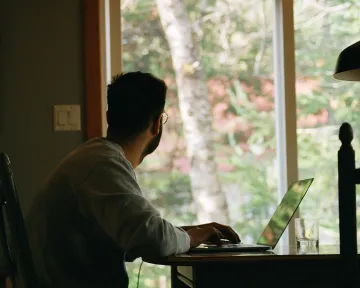
Stress can strain relationships, causing partners to withdraw or lash out. Being open about stress can help you both understand and support each other. To communicate stress, be vulnerable and take ownership of your emotions. Partner can offer help by asking "How can I help?" and providing emotional support.
Preparing for stress
Very often, we don’t anticipate being stressed - stressful experiences often take us by surprise, and can come out of nowhere. A sudden increase in workload. An unwelcome call from your mum. An unexpected bill. One moment you’re feeling calm and happy, the next, hot, panicky and irritated.
And it can be difficult to be self-aware when it comes to your response to stress. Very often it can feel like these means of expression are slightly outside of your control. Many people find themselves avoiding talking to others and becoming withdrawn without quite realising they’re doing it. Or surprising themselves by becoming suddenly snappy, irritable and unreasonable.
To give a little perspective on this, our coping mechanisms in these kinds of situations are often influenced by what we experienced growing up. If our parents didn’t show care easily, we may have become quite adept at looking after ourselves - indeed, we may have needed to - and so this instinct can kick back in automatically as an adult. Likewise, we often copy the behaviours of our parents and their reactions to stress when we’re younger - so if we saw them lashing out or getting angry in the face of difficult situations, we may end up doing the same ourselves.
How stress affects relationships
It’s not hard to see why either of these behaviours would affect your relationship negatively. If you’re becoming withdrawn, your partner is likely to feel pushed away. And if you get snappy, they may feel hurt or become defensive. What can be really problematic though, is that they may want to help, and feel that their efforts are being rebuffed. This can feel like a real rejection and can result in them becoming withdrawn or snappy themselves. As such the problems of stress can snowball: as one partner begins to act in a negative or unconstructive way, so might the other.
Further adding to this is the fact that they may not realise why you’re acting as you are. It may not be immediately apparent that it’s stress that’s causing you to say unkind things or be unresponsive when spoken to. They may feel it’s something they’ve done. This can obviously be very upsetting and frustrating - both for the hurt caused and confusion about why it’s happening.
Without some kind of intervention, the gap caused by this kind of situation can get wider and wider. And the more you feel like your partner - who, again, may just want to help - is a source of stress themselves, the less likely you’ll be willing to try to close that gap.
How to talk about stress
The best course of action when it comes to communicating stress is also one of the trickiest: to be open about it. In some ways, it can feel counter-intuitive to do this.
Stress can almost put you in survival mode. You may feel that if you can just ride it out and deal with it by yourself, you can get back to normal life. Stopping to explain yourself - letting someone else into the picture at that moment - can feel like losing control. It can feel like you’re making yourself vulnerable at a time when you can’t be.
But, while being open can indeed make you vulnerable, it can also be an empowering thing. It can allow you to take ownership of how you’re feeling, to recognise your emotions and to understand them in perspective. Saying how you’re doing out loud doesn’t make your problems any bigger - in fact, it can sometimes allow you to see they’re not as big as you thought.
And, of course, for all the reasons described above, it’s important to let your partner in so they don’t feel shut out, and so the situation doesn’t spiral into something deeper.
For the person on the receiving end of this communication - or who is trying to be - things can be a bit of a tightrope. The temptation often is to try and convince your partner to say what’s on their mind - sometimes through criticism or badgering. But, as many of us will have experienced, this is just as likely to get them to clam up further still.
Often, the best way to proceed in situations like this is by using an approach that allows the person experiencing the stress to stay in charge of how much they say. Very often, the best first step is to simply say: ‘How can I help?’ This puts agency firmly with the person experiencing difficulties and is less likely to make them feel under pressure to talk.
If they still don’t want to go into it, then it may be letting them know you’re there to talk if they need you and then giving them some space is all you can do for the time being. No matter how much you would like to, you can’t force someone to let you in - particularly someone who is already feeling withdrawn or irritable - but you can make sure they know you’re on their side.
And if your partner is open to talking, then the same emphasis - on them, and on their agency - should continue to apply. Again, there can be a temptation to immediately begin to offer solutions or to get them to ‘try to see the bright side’ - but, in a sense, these can be stressful responses in themselves. They can feel like judgements, or as if you’re dismissing their experience as one that’s easily fixable. In some cases, this is exactly the response that the cagey person was fearing: one that demands they accede to it, rather than one that properly takes in how they’re feeling, and what they’re thinking.
Instead, it can be much more productive to just sympathise and to ask questions. Very often, when we’re finding something difficult, what we want isn’t a solution, but just someone to be there with us and give emotional support. Supplying this - even if it means sitting quietly together or just hugging - may be all they need to begin to feel like the situation is under control.
We know that can sound a little vague, but really, all you’re doing is being curious and showing support. Don’t feel you have to always jump in and fill the silences. And it’s okay to admit you don’t know how to help! The main thing that matters is that your partner feels understood and cared for - the rest can follow.
How we can help
If you’re looking for support with your relationships, we can help. We offer a range of ways to speak with a trained relationship expert including ongoing counselling, 30 minute web and phone chats, and one session therapy.
Find out which service is right for you
How you can help
Have you found this advice helpful? Make a donation to help us reach more people and continue supporting the nation’s relationships:
Can't afford to donate? We understand. Instead, we ask that you leave us a 5 star review on Trustpilot.


